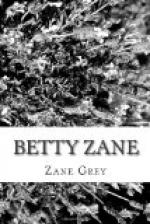“Yes,” answered Betty, “she is simply beautiful.”
“Come, Myeerah, we must go down to supper,” said Isaac, taking her in his arms and kissing her. “Now you must not be afraid, nor mind being looked at.”
“Everyone will be kind to you,” said Betty, taking her hand. Myeerah had slipped from Isaac’s arm and hesitated and hung back. “Come,” continued Betty, “I will stay with you, and you need not talk if you do not wish.”
Thus reassured Myeerah allowed Betty to lead her down stairs. Isaac had gone ahead and was waiting at the door.
The big room was brilliantly lighted with pine knots. Mrs. Zane was arranging the dishes on the table. Old Sam and Annie were hurrying to and fro from the kitchen. Col. Zane had just come up the cellar stairs carrying a mouldy looking cask. From its appearance it might have been a powder keg, but the merry twinkle in the Colonel’s eyes showed that the cask contained something as precious, perhaps, as powder, but not quite so dangerous. It was a cask of wine over thirty years old. With Col. Zane’s other effects it had stood the test of the long wagon-train journey over the Virginia mountains, and of the raft-ride down the Ohio. Col. Zane thought the feast he had arranged for Isaac would be a fitting occasion for the breaking of the cask.
Major McCullough, Capt. Boggs and Hugh Bennet had been invited. Wetzel had been persuaded to come. Betty’s friends Lydia and Alice were there.
As Isaac, with an air of pride, led the two girls into the room Old Sam saw them and he exclaimed, “For de Lawd’s sakes, Marsh Zane, dar’s two pippins, sure can’t tell ’em from one anudder.”
Betty and Myeerah did resemble each other. They were of about the same size, tall and slender. Betty was rosy, bright-eyed and smiling; Myeerah was pale one moment and red the next.
“Friends, this is Myeerah, the daughter of Tarhe,” said Isaac simply. “We are to be married to-morrow.”
“Oh, why did you not tell me?” asked Betty in great surprise. “She said nothing about it.”
“You see Myeerah has that most excellent trait in a woman—knowing when to keep silent,” answered Isaac with a smile.
The door opened at this moment, admitting Will Martin and Alfred Clarke.
“Everybody is here now, Bessie, and I guess we may as well sit down to supper,” said Col. Zane. “And, good friends, let me say that this is an occasion for rejoicing. It is not so much a marriage that I mean. That we might have any day if Lydia or Betty would show some of the alacrity which got a good husband for Alice. Isaac is a free man and we expect his marriage will bring about peace with a powerful tribe of Indians. To us, and particularly to you, young people, that is a matter of great importance. The friendship of the Hurons cannot but exert an influence on other tribes. I, myself, may live to see the day that my dream shall be realized—peaceful and friendly relations with the Indians, the freedom of the soil, well-tilled farms and growing settlements, and at last, the opening of this glorious country to the world. Therefore, let us rejoice; let every one be happy; let your gayest laugh ring out, and tell your best story.”




